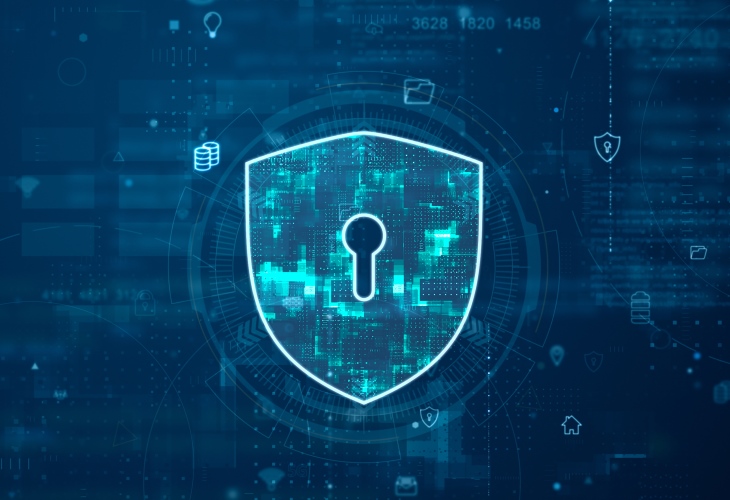In an increasingly interconnected and digitalized world, the maritime sector faces unique challenges in ensuring robust cybersecurity, information security, and personal data protection. As digitalization accelerates, maritime stakeholders must prioritize effective governance frameworks to safeguard critical infrastructure, vessels, and sensitive data. This article highlights the most important points for consideration in addressing these pressing concerns.
The maritime sector is undergoing a significant digital transformation, driven by the adoption of advanced technologies, such as the Internet of Things (IoT), automation, and data analytics, and it is essential that maritime sector organizations recognize and acknowledge this ongoing digital transformation in order to develop a governance framework that effectively addresses emerging cyber threats while promoting innovation and efficiency.
By recognizing this digital transformation, these organizations are ideally placed to proactively adapt their governance frameworks to address the evolving challenges of cybersecurity and data protection, thereby, taking a crucial step in ensuring a secure and resilient digital maritime ecosystem.
At the same time, effective cybersecurity governance and the protection of personal data in the maritime sector depend on collaboration between all the various stakeholders.
This collaboration encompasses shipping companies, port authorities, regulatory bodies, technology providers, maritime organizations, and industry associations. To this end, fostering information sharing on cyber threats, incidents, and vulnerabilities, as well as promoting the exchange of best practices for cybersecurity, information security, and personal data protection, becomes crucial.
Additionally, establishing collective response mechanisms to swiftly address cyber incidents and data breaches is vital. These collaborative efforts serve to mitigate risks effectively and bolster the overall security posture of the maritime sector.
In addition to these very important steps, it is essential that governments and international organizations establish comprehensive regulatory frameworks specifically tailored to the maritime sector and define clear and specific cybersecurity standards that address the unique challenges facing this sector. These regulatory frameworks must imperatively include cybersecurity standards, data privacy legislation, incident reporting protocols, and enforcement mechanisms.
These cybersecurity standards should include guidelines for the security of critical maritime systems (IT and OT), networks, and data, as well as protocols to identify, prevent, and respond to cyber threats. By defining a baseline level for cybersecurity requirements, these standards ensure consistency and facilitate compliance across the maritime sector.
Furthermore, given the sensitive nature of personal data collected in the maritime sector, regulatory frameworks should also incorporate robust data privacy legislation. This regulation should be aligned with established principles, such as the General Data Protection Regulation (GDPR), to safeguard the rights and privacy of individuals, and should address the collection, storage, processing, and sharing of personal data, establishing transparent and legal practices, and imposing strict sanctions when it comes to noncompliance.
Regulatory frameworks should also impose incident reporting protocols, requiring maritime organizations to promptly notify competent authorities of any security breaches or cyber-attacks and should further define the necessary information to be provided, the designated reporting channels, and the timeframe for reporting. By facilitating the sharing of information, the use of such incident reporting protocols allows for a coordinated response and enables the authorities to take the necessary safeguard measures. To ensure compliance and accountability, regulatory frameworks should establish robust compliance mechanisms, including audits, inspections, and sanctions for non-compliance with cybersecurity and data protection requirements. To this end, authorities should be equipped with legitimate powers enabling them to investigate incidents, impose fines or bring legal action against entities that do not comply with prescribed standards.
In practice, it is concluded that the application of stringent measures has a deterrent effect and encourages maritime organizations to give priority to cybersecurity and to the protection of personal data. Given the global nature of the maritime sector, it is essential to ensure harmonization and interoperability between different national jurisdictions in order to avoid regulatory fragmentation and the difficulty in applying disparate regulatory regimes on a case-bycase basis, thus, avoiding recourse to rules of private international law, whose difficult interpretation and determination of the applicable legal system may delay the effective resolution of the issues at stake.
Therefore, governments and international organizations should work together to establish common cybersecurity standards and data privacy principles across jurisdictions, and peer-to-peer collaboration can facilitate the sharing of best practices, knowledge, and information, enhancing the collective ability to effectively counter cyber threats.

But the challenge presented goes further!
Maritime organizations are required to conduct thorough risk assessments on a regular basis to identify vulnerabilities and potential cyber threats and implement proactive risk management strategies, including regular audits, penetration testing and employee awareness programs, which will help minimize the likelihood and impact of cyber incidents.
However, and in addition to risk assessment, ships, port facilities, and critical maritime infrastructure should be equipped with technological components to protect against cybersecurity attacks, including the implementation of firewalls, intrusion detection systems, encryption mechanisms, monitoring systems, and access controls, operating strictly in accordance with implemented, evaluated, and monitored cybersecurity policies and procedures in maritime sector organizations.
On the other hand, personal data collected in the maritime sector, including passenger information, crew records, and cargo details, must be handled with the utmost care. Therefore, maritime organizations must adhere to applicable data protection regulations, such as the General Data Protection Regulation (GDPR) in the European Union or similar legislation in other regions of the globe. These regulations or regulatory standards, define the rights and responsibilities of data controllers and data processors and set strict guidelines for the collection, storage, processing, and sharing of personal data.
In addition to these responsibilities, maritime organizations should, in some cases, adopt a ‘privacy by design and privacy by default’ approach, integrating privacy and data protection principles into the design and development of systems, processes, and services from the beginning. With the implementation of privacy-enhancing measures, such as data minimization, pseudonymization, and encryption, maritime organizations can reduce privacy risks and proactively protect personal data.
Additionally, maritime organizations should implement robust data lifecycle management practices, which involve establishing clear policies and procedures for the entire data lifecycle, including the collection, storage, processing, retention, and disposal of data, and ensuring regular audits and reviews to ensure compliance with data protection requirements.
They should implement strict access controls to prevent unauthorized access to personal data, including rolebased access controls, multi-factor authentication, and user permission management, not forgetting that sensitive personal data should be encrypted both in transit and at rest to protect against unauthorized interception or data breaches. Also, when contracting with third-party service providers or data processors, maritime organizations should ensure that data protection agreements are in place that outline the responsibilities and obligations of third parties in protecting personal data, as well as ensuring that such agreements include provisions for regular monitoring and auditing of their data protection practices.
Faced with situations related to data privacy rights, organizations must bear in mind that data subjects have certain rights regarding their personal data, including the right to access, rectify, restrict processing, and erase their data. Therefore, they should implement procedures to respond to their requests and ensure that they can effectively exercise their rights through appropriate mechanisms that allow for identity verification of the data subjects and convenient processing of their requests.

Finally, investing in cybersecurity and protection data training programs for maritime personnel is crucial to enhance awareness and response capabilities. Employees of maritime organizations should be educated on the importance of data protection, current privacy regulations, and best practices in information security. Regular training sessions and awareness campaigns can significantly strengthen the overall security posture.
Maritime organizations should develop comprehensive cybersecurity training programs tailored to the specific needs of their personnel and these programs should cover a wide range of topics, including cybersecurity best practices, threat detection, incident response, and data protection. Investing in training and promoting a culture of cybersecurity awareness, maritime organizations can significantly improve their ability to detect and respond effectively to cyber threats. Well-informed employees are crucial to preventing security incidents, mitigating risks, and protecting critical systems, ships, and sensitive data.
Therefore, ongoing training and awareness initiatives contribute to the creation of a strong cybersecurity culture in this sector. In sum, it can be said that the governance of cybersecurity, information security, and privacy data protection in the maritime sector requires a proactive and collaborative approach.
Recognizing digital transformation, a collaborative approach, establishing regulatory frameworks, conducting risk assessments and management, protecting critical infrastructure, ensuring data privacy and protection, and promoting training and awareness, can strengthen the maritime sector’s defenses against cyber threats and safeguard sensitive information.
Implementing these fundamental imperatives will ensure, for certain, a secure and resilient maritime ecosystem in the face of evolving cybersecurity challenges.



![David-Lannoy-Managing-the-success-of-Enterprise-Risk-Management-[KRIs]](https://insights.pecb.com/wp-content/uploads/2017/01/David-Lannoy-Managing-the-success-of-Enterprise-Risk-Management-KRIs-500x350.png)





